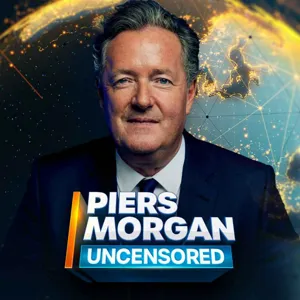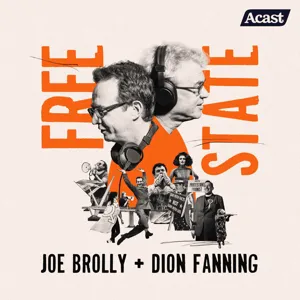Podcast Summary
Longstanding land disputes and religious tensions fueling Israeli-Palestinian crisis: The Israeli-Palestinian conflict goes beyond the eviction of Palestinian families and involves questions of Israeli sovereignty, religious significance, and the complex realities of the densely populated Gaza Strip.
The current crisis between Israelis and Palestinians is rooted in longstanding land disputes and religious tensions, which came to a head last month when Israeli police raided the Al Aqsa mosque in Jerusalem, leading to widespread violence and unrest. This conflict involves more than just the eviction of Palestinian families from their homes in East Jerusalem, but also questions of Israeli sovereignty and religious significance. The situation has escalated with Hamas militants firing rockets into Israel, resulting in heavy Israeli retaliation and a significant loss of civilian lives on both sides. The conflict is further complicated by the densely populated nature of the Gaza Strip and the ongoing control of Hamas over the area. It's essential to understand the historical context and religious significance of the land disputes to grasp the complexity and gravity of the situation.
Israel-Hamas Conflict: Complex Political Landscape and Humanitarian Crisis: Call for an immediate ceasefire to prevent further loss of innocent lives in the Israel-Hamas conflict, rooted in historical contexts and power imbalance, with potential for civilian casualties and targeting of civilian structures.
The ongoing conflict between Israel and Hamas in Gaza, with the recent escalation in East Jerusalem, is taking place in a politically unstable region with a power imbalance between the two parties. The Israeli response, while understood as a right to self-defense, raises concerns about proportionality and the potential for civilian casualties. The Israeli government's history of military actions against Hamas and the lack of a functioning Palestinian Authority add to the complexity of the situation. The targeting of civilian structures, including media outlets, further exacerbates the humanitarian crisis. It is crucial to call for an immediate ceasefire to prevent further loss of innocent lives. The situation is deeply rooted in historical contexts, including the Holocaust, antisemitism, and the displacement of Jews from various countries. The emotions and burdens of political power and self-determination are significant, but they should not overshadow the urgent need for peace and protection of civilians.
Actions of both sides fuel the ongoing conflict between Israelis and Palestinians: Targeting media organizations and civilian buildings is morally questionable and counterproductive to peace. A comprehensive and sustainable solution is needed to respect the rights and dignity of both Israelis and Palestinians.
The ongoing conflict between Israelis and Palestinians is complex and requires a nuanced understanding. The actions of both sides have consequences that make peace and safety further away. The targeting of media organizations and civilian buildings, as seen in the recent bombing of the AP and Al Jazeera building in Gaza, is not only morally questionable but also counterproductive to the goal of peace. The lack of a Palestinian state or equal citizenship in Israel creates a cycle of violence and animosity. It's crucial to focus on finding a solution that respects the rights and dignity of both Israelis and Palestinians. The debate over specific actions should not overshadow the need for a comprehensive and sustainable peace.
Israeli military's attack on Gaza building used by journalists was a strategic and moral mistake: The Israeli military's attack on a building used by journalists in Gaza, resulting in civilian casualties, was criticized as a strategic and moral mistake due to lack of clear evidence for military necessity and perceived attempt to suppress reporting on the conflict.
The Israeli military's decision to bomb a building used by journalists in Gaza, resulting in civilian casualties, was a strategic and moral mistake. The lack of clear evidence presented for the military necessity of the attack has fueled more cynical interpretations, such as an attempt to suppress reporting on the conflict. The power imbalance between the Israeli government and Palestinians, and the disproportionate use of force, were also highlighted. The recent coverage of the evictions in Sheikh Jarrah and the horrifying images coming out of Gaza during the conflict have garnered widespread attention and sympathy, especially in the context of ongoing conversations about social justice and human rights. Additionally, the negative perception of Israeli Prime Minister Benjamin Netanyahu and the growing number of Democratic leaders speaking out against the conflict have contributed to a shift in public discourse, with a more critical and nuanced approach to the situation.
Israel-Palestine crisis: Beyond settlements and a two-state solution: Bernie Sanders' op-ed reveals how Israel's authoritarian, racist government obstructs a contiguous Palestinian state and second-class citizenship for Palestinians within Israel. Diplomacy is challenging due to power imbalance, and the Biden admin continues support for Israel's self-defense, hindering a ceasefire call.
The current crisis in Israel and Palestine is not just about settlements or a two-state solution, but a larger issue of authoritarian racist nationalist movements gaining power around the world. Bernie Sanders' op-ed highlights how Netanyahu's corrupt and racist government in Israel is similar to other authoritarian regimes, making it harder for a contiguous Palestinian state to exist. Extremists on both sides are driving the debate, and Palestinians within Israel face second-class citizenship. The failure to achieve a two-state solution is not solely the Palestinian Authority's responsibility, but the current power imbalance makes diplomacy challenging. Despite calls for an immediate ceasefire from progressives and 28 Senate Democrats, the Biden administration continues to support Israel's right to defend itself, blocking a UN Security Council statement. This situation underscores the need for a more nuanced understanding of the complex geopolitical issues at play.
Biden administration's response to Israel-Palestine conflict causes confusion and frustration: The Biden administration's reluctance to publicly call for a ceasefire and criticize Israel's actions in the Israel-Palestine conflict is causing international concern and fueling tensions, with some attributing this stance to the U.S.'s longstanding commitment and support for Israel.
The Biden administration's response to the ongoing conflict between Israel and Palestine is causing confusion and frustration due to their reluctance to publicly call for a ceasefire and criticize specific actions taken by Israel. This is despite growing international pressure and concerns over human rights violations. Some argue that this stance is a result of the U.S.'s longstanding commitment to Israel and the significant financial and military support given to the country. However, others believe that the Biden team is hesitant to be pulled into news cycles and wants to focus on diplomacy behind the scenes. Regardless, the lack of clear and public action from the U.S. is leading to perceptions of complicity and fueling tensions in the region. The moral and security implications of this situation are significant and warrant further discussion and attention.
Adapting U.S. communication strategy towards Israeli-Palestinian conflict: Younger people and progressives demand more vocal U.S. stance on moral issues, including civilian casualties and ceasefires in Israeli-Palestinian conflict. Criticizing allies can strengthen relationships and broker peace.
The way the U.S. communicates about its foreign policy towards the Israeli-Palestinian conflict needs to evolve to reflect changing political and generational dynamics. The mantra of avoiding daylight between the U.S. and its allies is no longer tenable for many, especially younger people and progressives who view silence on moral issues as bizarre. The world has changed, and the U.S. must adapt its communication strategy to address concerns over civilian casualties and call for ceasefires. Criticizing allies when necessary can even strengthen relationships and broker peace. The power dynamics have shifted, and the U.S. can be more vocal about its concerns while maintaining its role as a broker. Additionally, recent events like the Abraham Accords may have fueled underlying tensions, highlighting the need for more open dialogue.
Tensions in Israel and Palestine worsen, ceasefire needed: The Biden admin should call for a ceasefire, facilitate peace talks, empower the Palestinian authority, offer incentives, and apply pressure with conditions on military aid. Individuals can contact reps to urge a ceasefire. Vaccines are effective, protect against variants, and reduce transmission, making mask guidelines for the vaccinated more relaxed.
The current crisis in Israel and Palestine exacerbated tensions due to the perceived lack of options for the Palestinians, making them more desperate than before. Immediate action is needed, including a public call for a ceasefire from the Biden administration. Long-term, the U.S. should facilitate negotiations between the parties, empowering the Palestinian authority and offering incentives for peace, while applying pressure with conditions on military aid. Individuals can also make a difference by contacting their representatives and urging them to call for a ceasefire. Regarding the CDC's new mask guidelines, the vaccines have proven to be highly effective, working against variants and protecting against both symptomatic and asymptomatic infections. The low level of virus in vaccinated individuals makes it unlikely for them to transmit the virus. There have been few reported serious cases of breakthrough infections, but exceptions exist. Overall, the data supports the CDC's decision to relax mask guidelines for the vaccinated.
Communicating COVID-19 updates clearly: Maintain focus on science, respect individual choices, and avoid misinformation when communicating COVID-19 updates.
As new information about COVID-19 and vaccines emerges, it's crucial to communicate clearly and avoid confusion. The science and data should guide our actions, but messaging must be carefully crafted to reach different audiences. For instance, the CDC's recent guidance stating that vaccinated individuals are safer indoors without masks doesn't mean it's mandatory for them to remove masks. Instead, it's a scientific statement about reduced risk. Store owners and individuals have the right to set their own mask policies based on their comfort levels and verification capabilities. The focus should remain on following the science while respecting individual choices and avoiding misinformation.
Communicating facts with respect and following public health guidelines: Stay respectful and factual when correcting misinformation, follow CDC guidelines, and get vaccinated to protect against variants and resume normal activities.
Communication, especially as a prominent scientist or doctor, requires careful adherence to facts and data in the face of misinformation, even when dealing with political figures. Dr. Anthony Fauci emphasized the importance of staying respectful and factual when correcting misinformation, rather than engaging in confrontational exchanges. Additionally, following public health guidelines, such as wearing masks, is essential, especially when interacting with those who may be unvaccinated or uncomfortable without masks. The CDC's role is to provide guidelines based on the best available science, and for those who are vaccinated, they are protected against the variants and can resume normal activities without the need for masks. Overall, the conversation highlighted the importance of clear communication and following science-backed guidelines to navigate the complexities of public health and misinformation.
Balancing Science and Human Behavior in a Pandemic: Vaccinated individuals can reduce their risk, but unvaccinated, children, and those with weakened immune systems must remain cautious. Empathy and grace are key in navigating this complex situation.
While vaccinated individuals can enjoy a greater degree of freedom and reduced risk of contracting COVID-19, unvaccinated individuals, children, and those with compromised immune systems must remain cautious and continue wearing masks in crowded areas. The ongoing challenge lies in the intersection of scientific guidance and human behavior, leaving individuals and communities in difficult situations. It's crucial to remember that everyone's circumstances and risk profiles are unique, and empathy and grace should be extended to all parties involved. Public health officials and experts are learning as they go in this unprecedented pandemic, and mistakes and changing guidelines are to be expected. Let us not judge those who continue to wear masks or those who choose not to, but rather support each other through this challenging time. Additionally, the Supreme Court's decision to take up a case on the constitutionality of Mississippi's ban on most abortions after 15 weeks of pregnancy could potentially lead to a reconsideration of Roe v. Wade, adding another contentious issue to the ongoing national conversation.
Taking Action on Abortion Rights and Criminal Justice Reform: Advocate for ending the Hyde Amendment, allowing prescription abortion medication through the mail, and staying engaged in district attorney elections to impact criminal justice reform. Recognize the Supreme Court's political nature and potential consequences beyond Roe v. Wade.
While we wait for the Supreme Court's decision on abortion rights, it's important for individuals to take action at the local and state levels. Advocates are urging the Biden administration to protect abortion access by ending the Hyde Amendment and allowing prescription abortion medication through the mail. Meanwhile, district attorney elections, like the one in Philadelphia between Larry Krasner and his opponent, can significantly impact criminal justice reform and mass incarceration. It's crucial for voters to stay engaged and aware of these races, as low turnout could lead to setbacks for progressive policies. Additionally, the Supreme Court's decision on Roe v. Wade will have far-reaching consequences, and it's essential to recognize that the court is a political body and that access to healthcare can be restricted in various ways beyond overturning Roe. Overall, staying informed and actively participating in elections at all levels is key to making progress on critical issues.
Senate Debates Voting Rights Bills and COVID-19: Senate Democrats push for voting rights bills, but face challenges due to filibuster and Republican opposition. Dr. Fauci discusses COVID-19 on a podcast.
The For the People Act, a voting rights bill, passed out of the Senate Rules Committee but its path to becoming law is uncertain due to the need to change the filibuster and secure unanimity among all 50 Senate Democrats. Senator Joe Manchin has expressed opposition to the For the People Act and support for the John Lewis Voting Rights Act instead. The John Lewis Act would reinstate preclearance for state voting law changes, but even with Manchin's support, it would still require the support of nine more Republicans to pass. The pressure is on Democrats to find a way to pass these important voting rights bills. Additionally, Anthony Fauci, the Director of the National Institute of Allergy and Infectious Diseases, joined the podcast for a discussion on COVID-19. Lastly, a clarification was made regarding a previous story about the death of a family cat named Snooper. Despite the cat's mean behavior, the family was sad about its death and the reason for leaving it in the basement was due to the frozen ground preventing burial in the backyard.
Emphasizing authenticity and corrections: Hot Save America prioritizes truth and rectifies misunderstandings, showcasing respect for individuals and importance of corrections in podcasting.
Despite the intense and sometimes controversial nature of their podcast, the hosts of Hot Save America prioritize authenticity and correction. When a misunderstanding occurred regarding a comment made earlier in the episode, the host reassured the audience that it was not intended to be callous due to their deep respect for the person in question. They also mentioned the importance of corrections, particularly those demanded by their family, and the ongoing issue of an apology from Larry David. The podcast is a Crooked Media production, and its team includes Michael Martinez as executive producer, Flavia Casas as senior producer, Jazzy Marine and Olivia Martinez as associate producers, Andrew Chadwick as mixer and editor, Kyle Seglen as sound engineer, and a team of production and digital support staff. The podcast's end serves as a space for corrections and addressing any lingering grudges.






